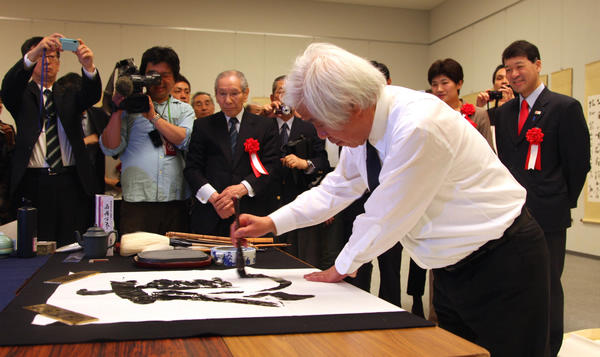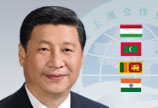The weight of history bears down
By Wang Chenyan (China Daily) Updated: 2012-06-21 08:30Controversial comments about historical events made by Japanese political extremists have prompted the public in both China and Japan to reflect on the relationship between the two countries, according to analysts looking into the results of a survey conducted for the Eighth Beijing-Tokyo Forum.
Historical problems are a cause for concern in Sino-Japanese relations. The survey indicates that Japan's 1937 invasion of China continues to be a prime cause of unfavorable perceptions of the Japanese, according to 78.6 percent of Chinese respondents.
 |
|
A Japanese calligrapher demonstrates his skills at an exhibition to mark the 40th anniversary of the normalization of the Sino-Japanese relationship. Liu Lin / Xinhua |
The number of Japanese people who believe that the country must resolve a number of important historical issues to improve relations between Beijing and Tokyo has increased, compared with the 2011 survey. The respondents were asked to identify a number of issues hampering better mutual relations and the number of people who believe that "Japan's war reparations" prevented greater understanding rose by 5.7 percent from last year, "Japanese history textbook controversies" saw a rise of 0.8 percent, while "Japan's (lack of) acknowledgement of the Nanjing Massacre" was 3 percent higher.
"History is not a 'core interest', but it is a focus between China and Japan which may be considered small or great (according to personal perception)," said Zhou Yongsheng, a professor of Japanese studies at China Foreign Affairs University in Beijing.
Right-wing extremists have managed to influence Japanese public opinion on certain topics, despite the fact that they only represent a minute percentage of the population and have never wrested power, according to the report.
"Tolerance by the Japanese government and the public, which encourages them in both word and deed, will always trigger suspicions and grievances in other Asian countries and present a serious threat to Sino-Japanese relations in particular," said Zhou, who added that the Japanese right has fueled a perception of aggression toward China.
That impression was recently strengthened by the mayor of Nagoya, Takashi Kawamura, who dismissed the deaths of 300,000 Chinese in Nanjing, as something that "probably never happened" during a February meeting with a delegation from the city. Kawamura's comments provoked public fury in China and prompted Nanjing to suspend official exchanges with Nagoya.
"We cannot be so optimistic to suppose that the increasing number of the Japanese public who are concerned about their country's historical problems demonstrates that they share the same opinion as China on certain topics. However, I do think, apart from intellectuals, more people in Japan, who have not received advanced education, have started to care and think about the fundamental reasons for tension between Beijing and Tokyo," said Zhou, who explained that history can help people think about who they are and their relationships with other countries.
The two influential neighbors share 2,000 years of cultural links and are deeply and increasingly connected through economics, science and other fields.
The Chinese public's general impression of Japan has become more positive, according to the survey. The option "Prime Ministers should not visit Yasukuni Shrine (which commemorates Japan's war dead) either in an official or personal capacity" was supported by 35.5 percent of the Japanese "intellectual" respondents.
"Intellectuals easily draw lessons from the past and pay greater attention to the long-term influence of history. If more people join in and cope prudently with historical problems, there will be fewer obstacles to the development of economic and trade relations between China and Japan," said Zhou.
wangchenyan@chinadaily.com.cn










